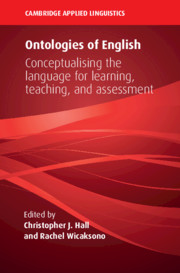Book contents
- Ontologies of English
- The Cambridge Applied Linguistics Series
- Ontologies of English
- Copyright page
- Dedication
- Contents
- Figures
- Tables
- Contributors
- Series Editors’ Preface
- Acknowledgements
- Transcription Conventions
- Part I Introduction
- Part II English in/for L2 Learning and Teaching
- Part III English in Schools
- Part IV Assessing English
- Part V English in Lingua Franca Contexts
- 12 What Is English in the Light of Lingua Franca Usage?
- 13 English as a Lingua Franca and Transcultural Communication
- 14 Exploring Standards-Based, Intelligibility-Based, and Complex Conceptions of English in a Lingua Franca Context
- Part VI English and Social Practice
- Part VII Commentary and Conclusions
- Index
- References
13 - English as a Lingua Franca and Transcultural Communication
Rethinking Competences and Pedagogy for ELT
from Part V - English in Lingua Franca Contexts
Published online by Cambridge University Press: 24 December 2019
- Ontologies of English
- The Cambridge Applied Linguistics Series
- Ontologies of English
- Copyright page
- Dedication
- Contents
- Figures
- Tables
- Contributors
- Series Editors’ Preface
- Acknowledgements
- Transcription Conventions
- Part I Introduction
- Part II English in/for L2 Learning and Teaching
- Part III English in Schools
- Part IV Assessing English
- Part V English in Lingua Franca Contexts
- 12 What Is English in the Light of Lingua Franca Usage?
- 13 English as a Lingua Franca and Transcultural Communication
- 14 Exploring Standards-Based, Intelligibility-Based, and Complex Conceptions of English in a Lingua Franca Context
- Part VI English and Social Practice
- Part VII Commentary and Conclusions
- Index
- References
Summary
Research into global uses of English, and particularly ELF (English as a Lingua Franca), has highlighted the diversity and fluidity of communicative practices in intercultural and transcultural communication through English. Successful intercultural/transcultural communication involves the ability to make use of and negotiate multilingual/plurilingual linguistic resources, a variety of communicative practices and strategies, and movement between global, national, local, and emergent frames of reference. This is a very different conception of competence to that typically utilised in English language teaching (ELT) with its pre-determined ‘code’ consisting of a restricted range of grammatical, lexical, and phonological forms and minimal concern with the sociocultural dimension of communication. The need for a reconceptualisation of language in applied linguistics and more recently ELT has begun to receive serious scholarly attention. However, this needs to be accompanied by a focus on the wider intercultural and transcultural communicative practices in which language is embedded and enmeshed. This entails recognition of the central place of intercultural competence and the awareness that is necessary to manage such complexity, variation, and fluidity in communication. As such, this chapter addresses Hall and Wicaksono’s (this volume) call to interrogate and be “explicit about what we, as applied linguists, think English is – our ontologies of English – and how these ontologies underpin our educational ideologies and professional practices”, with a particular focus on the intercultural and transcultural dimensions to both English use and education policy and practice.
Keywords
- Type
- Chapter
- Information
- Ontologies of EnglishConceptualising the Language for Learning, Teaching, and Assessment, pp. 253 - 272Publisher: Cambridge University PressPrint publication year: 2020
References
- 13
- Cited by

